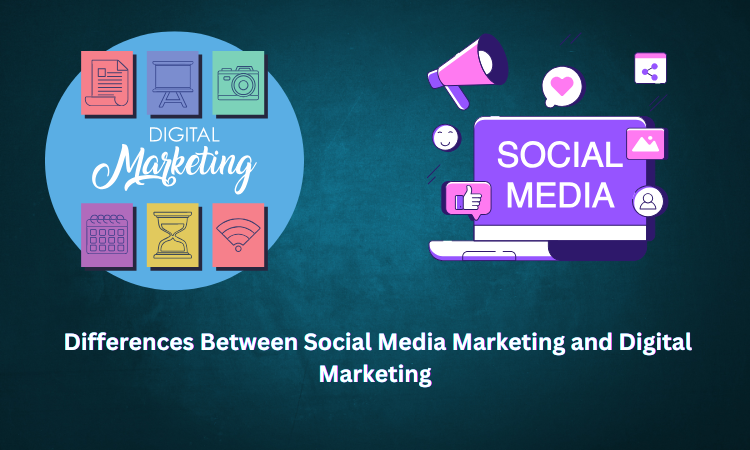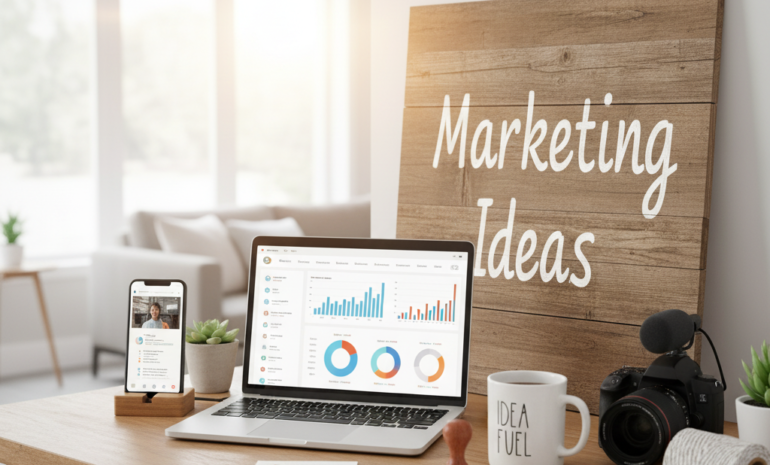Marketing has evolved with technology, offering businesses new ways to connect with customers.
Two popular approaches are social media marketing and digital marketing.
Social media marketing focuses on platforms like Facebook, Instagram, and Twitter to engage audiences, while digital marketing includes broader strategies like SEO, PPC, email marketing, and content marketing.
Both methods have unique strengths, but which one is better? The answer depends on business goals, audience, and budget.
Digital Marketing vs. Social Media Marketing: Which Drives Better Results?
This guide explores the differences, benefits, and limitations of social media marketing and digital marketing, helping businesses choose the right strategy or combine both for the best results.
Understanding Social Media Marketing
Social media marketing is the use of platforms like Facebook, Instagram, Twitter, and LinkedIn to promote businesses, products, or services.
It focuses on creating and sharing content to engage audiences and build brand awareness.
Key Characteristics
Social media marketing focuses on building connections through user engagement and interactions.
Businesses use a mix of paid ads, organic posts, and influencer partnerships to reach their audience.
Content comes in different formats, including text updates, images, videos, and live streams, making it flexible for various marketing goals.
This approach allows brands to engage directly with customers, encourage discussions, and create a loyal community.
The effectiveness of social media marketing depends on active participation and creative content strategies.
Popular Platforms
- Facebook – Large user base, ideal for ads and community building
- Instagram – Focus on visuals, great for brand storytelling
- Twitter – Best for real-time updates and customer interaction
- LinkedIn – Professional networking and B2B marketing

Strengths
Social media marketing helps businesses connect with people through likes, shares, and comments.
This high engagement makes it easier to build strong relationships with customers. It also increases brand visibility, helping more people learn about a business.
If content is interesting or unique, it can spread quickly, reaching a large audience in a short time.
This viral potential makes social media a powerful tool for growing a brand online.
Limitations
Social media marketing depends on platform algorithms, which often change. These changes can affect how many people see a business’s posts, making success unpredictable.
Businesses may need to adjust their strategies often to stay visible. Another challenge is negative feedback.
Customers can leave public complaints or bad reviews, which can harm a brand’s reputation.
If not handled properly, criticism can spread quickly and affect how people view the business.
Understanding Digital Marketing
Digital marketing is the use of online channels to promote businesses, products, or services.
It includes various strategies that help brands reach their target audience and drive sales.
Key Components
Digital marketing uses different online platforms to promote businesses. It focuses on data to understand customer behavior and target the right audience more effectively.
Businesses can use both paid methods, like ads, and organic methods, like SEO and content marketing, to attract customers.
This mix of strategies helps brands reach more people and improve their marketing results over time.
Channels Involved
- SEO (Search Engine Optimization) – Improves website ranking on search engines
- PPC (Pay-Per-Click Advertising) – Paid ads that appear on search engines and websites
- Email Marketing – Sends promotional messages directly to customers’ inboxes
- Content Marketing – Creates blogs, videos, and other content to attract audiences

Strengths
Digital marketing helps businesses reach a wider audience through different online platforms.
By using multiple strategies, businesses can improve their results and attract more customers.
Data and analytics play a key role in understanding customer behavior, allowing businesses to target the right people with personalized content.
This makes digital marketing an effective way to increase brand awareness, drive sales, and improve overall marketing success.
Limitations
Digital marketing requires technical skills to be successful. Businesses need knowledge of SEO, data analysis, and online advertising to create effective campaigns.
Without the right expertise, results may be weak.
Another challenge is cost.
While some methods, like content marketing, are low-cost, paid advertising campaigns can be expensive.
Small businesses with limited budgets may find it difficult to compete with larger companies that invest more in digital ads and marketing tools.
Key Differences Between Social Media Marketing and Digital Marketing
There are following differences between Social Media Marketing and Digital Marketing
| Aspect | Social Media Marketing | Digital Marketing |
| Scope | Focuses only on social media platforms like Facebook, Instagram, Twitter, and LinkedIn. | Covers a wide range of online channels, including social media, search engines, email, and websites. |
| Reach | Limited to social media users; effectiveness depends on platform popularity. | Reaches a broader audience across various digital platforms and devices. |
| Methods Used | Involves organic posts, paid advertisements, influencer marketing, and community engagement. | Uses SEO, PPC, email marketing, content marketing, affiliate marketing, and more. |
| Engagement | High interaction through likes, comments, shares, and direct messaging. | Less direct engagement; focuses on user behavior, clicks, and conversions. |
| Cost | Can be budget-friendly with organic content, but paid ads require continuous investment. | Can be expensive, especially for paid campaigns, but offers diverse budget options. |
| Flexibility | Allows quick content updates and trend-based marketing strategies. | Requires long-term planning, but offers sustainable brand growth. |
| Data & Targeting | Uses built-in platform tools for audience targeting based on demographics and interests. | Uses advanced data analytics, customer segmentation, and tracking tools for precise targeting. |
| Virality Potential | Content can go viral quickly, spreading through shares and trends. | Lower virality potential but ensures steady and consistent audience reach. |
| Best For | Brand awareness, customer engagement, and community building. | Driving website traffic, lead generation, and long-term business growth. |

Which One is Better?
Choosing between social media marketing and digital marketing depends on various factors, including business type, goals, and budget.
Each approach has its strengths, and the best choice depends on what a business wants to achieve.
Factors Influencing the Choice
- Business Type – Small businesses, startups, and consumer-focused brands may benefit more from social media marketing, while larger businesses may need a broader digital marketing strategy.
- Goals – If the goal is brand awareness and engagement, social media marketing is ideal. If the focus is lead generation, website traffic, or long-term growth, digital marketing is a better option.
- Budget – Businesses with limited budgets may start with organic social media marketing, while those with more resources can invest in paid ads, SEO, and other digital strategies.
When to Prioritize Social Media Marketing?
Social media marketing is a good choice when a business wants to quickly build brand awareness.
It works best if the target audience spends a lot of time on platforms like Facebook, Instagram, or Twitter.
Businesses that need direct interaction with customers, such as responding to comments or messages, can benefit from this approach.
Social media is also useful for brands that rely on influencer marketing or viral content to reach more people.
This strategy helps businesses stay connected with their audience and grow their brand in a short time.
When Digital Marketing is the Better Option?
Digital marketing is the best choice for businesses that want to attract long-term, high-quality leads.
It helps reach customers through multiple channels, including search engines, websites, and email.
Strategies like SEO, PPC, and email marketing can deliver better results by targeting the right audience effectively.
Digital marketing also provides detailed data and analytics, allowing businesses to track performance and improve their campaigns.
If a company needs a steady and reliable way to grow, digital marketing offers a strong foundation for success.
How Businesses Can Integrate Both for Optimal Results?
Businesses can combine social media marketing and digital marketing to get the best results.
Social media can engage audiences, while SEO and PPC help drive website traffic. Companies can use social platforms to share blogs and videos, increasing content visibility.
Running social media ads alongside email marketing can improve customer retention.
Digital marketing analytics can also help refine social media strategies, ensuring better targeting and messaging.
By using both approaches together, businesses can reach more people, strengthen their brand, and improve overall marketing success.

Why You Should Choose Brandout for Social Media and Digital Marketing Solutions?
Social media and digital marketing work best when combined. Brandout’s digital marketing solutions make sure your social media campaigns and digital marketing strategies align to meet your business goals.
We focus on creating a cohesive strategy that helps you engage with your audience effectively across all platforms.
Conclusion:
Both social media marketing and digital marketing offer unique advantages, and the best choice depends on business goals, audience, and budget.
Social media marketing is ideal for fast engagement, brand awareness, and community building, while digital marketing provides a broader reach, long-term growth, and data-driven targeting.
Instead of choosing one over the other, businesses can combine both strategies to maximize success.
A well-balanced approach helps businesses stay competitive, connect with the right audience, and achieve lasting success in the digital world.
Frequently asked questions:
What are some examples of digital and social media marketing?
Digital marketing includes SEO, PPC, email marketing, and content marketing.
Social media marketing involves platform-based strategies like organic posts, paid ads, and influencer collaborations on Facebook, Instagram, and Twitter.
Is content marketing a type of digital marketing?
Yes, content marketing is a part of digital marketing. It includes blogs, videos, infographics, and other content designed to attract and engage audiences.
What is the difference between digital marketing and social media marketing?
Digital marketing includes all online marketing channels, such as search engines, websites, and email. Social media marketing is a subset focused only on brand promotion through social platforms.
Is social media marketing in high demand?
Yes, social media marketing is in high demand as businesses rely on platforms like Facebook, Instagram, and TikTok to engage audiences, build brand awareness, and drive sales.




